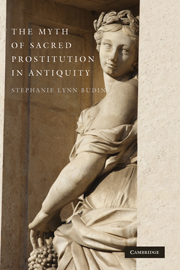Book contents
- Frontmatter
- Contents
- Acknowledgments
- Abbreviations
- THE MYTH OF SACRED PROSTITUTION IN ANTIQUITY
- 1 Introduction
- 2 The Ancient Near Eastern Data
- 3 The So-Called “Evidence”
- 4 Herodotos
- 5 In the Footsteps of Herodotos: Lucian and “Jeremiah”
- 6 Pindar Fragment 122
- 7 Strabo, Confused and Misunderstood
- 8 Klearkhos, Justinus, and Valerius Maximus
- 9 Archaeological “Evidence” from Italy
- 10 The Early Christian Rhetoric
- 11 Last Myths
- Bibliography
- Index
- Index Locorum
4 - Herodotos
Published online by Cambridge University Press: 18 August 2009
- Frontmatter
- Contents
- Acknowledgments
- Abbreviations
- THE MYTH OF SACRED PROSTITUTION IN ANTIQUITY
- 1 Introduction
- 2 The Ancient Near Eastern Data
- 3 The So-Called “Evidence”
- 4 Herodotos
- 5 In the Footsteps of Herodotos: Lucian and “Jeremiah”
- 6 Pindar Fragment 122
- 7 Strabo, Confused and Misunderstood
- 8 Klearkhos, Justinus, and Valerius Maximus
- 9 Archaeological “Evidence” from Italy
- 10 The Early Christian Rhetoric
- 11 Last Myths
- Bibliography
- Index
- Index Locorum
Summary
(Histories 1.199) The most shameful of the customs among the Babylonians is this: It is necessary for every local woman to sit in the sanctuary of Aphrodite once in life to “mingle” with a foreign man. But many do not deign to mingle with the others, thinking highly of themselves because of their wealth, and they set themselves before the sanctuary having arrived in covered chariots, with many a maidservant in tow. But the majority act thus: In the temenos of Aphrodite many women sit wearing a garland of string about their heads. Some come forward, others remain in the background. They have straight passages in all directions through the women, by which the foreigners passing through might make their selection. Once a woman sits there, she may not return home before someone of the foreigners tossing silver into her lap should mingle with her outside the sanctuary. And in tossing he must say thus: “I summon you by the goddess Mylitta.” The Assyrians call Aphrodite Mylitta. The silver is of any amount, for it may not be rejected: This is not their sacred custom, for the money becomes sacred. The woman follows the first man who tossed her silver, nor may she reject anyone. When she should have mingled, having discharged her obligation to the goddess, she leaves for home, and after this time you might not take her, offering gifts no matter how great. […]
- Type
- Chapter
- Information
- The Myth of Sacred Prostitution in Antiquity , pp. 58 - 92Publisher: Cambridge University PressPrint publication year: 2008

